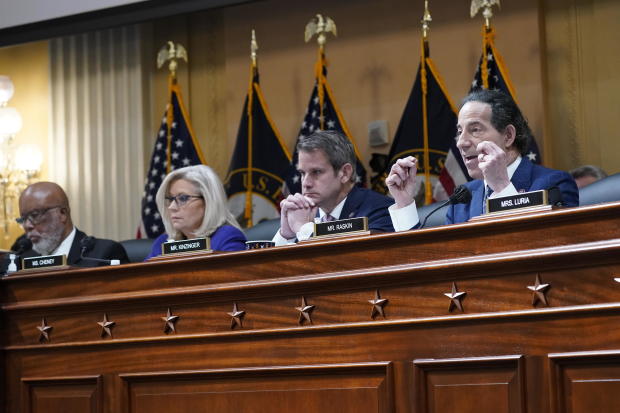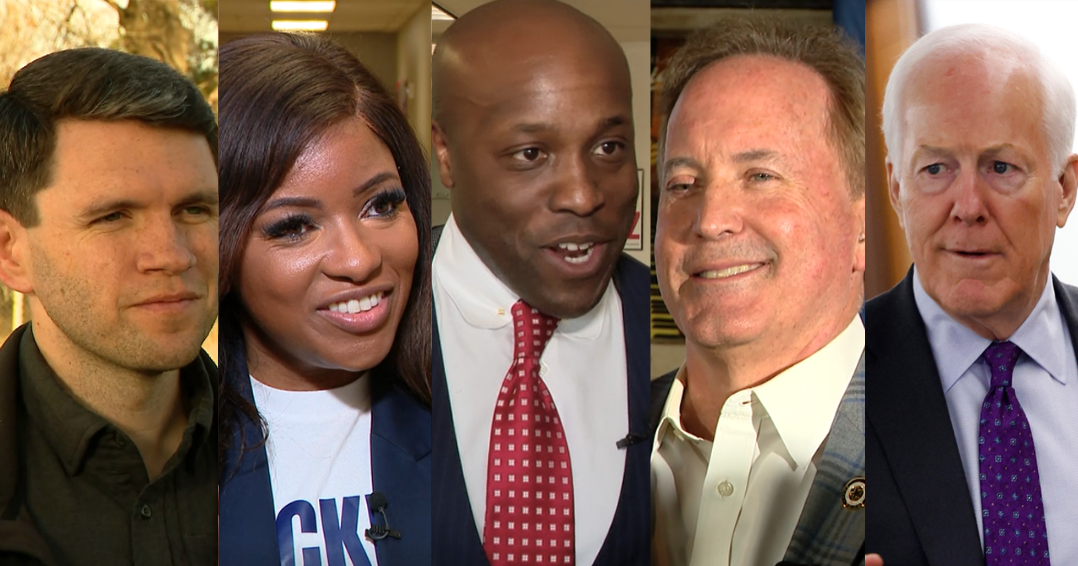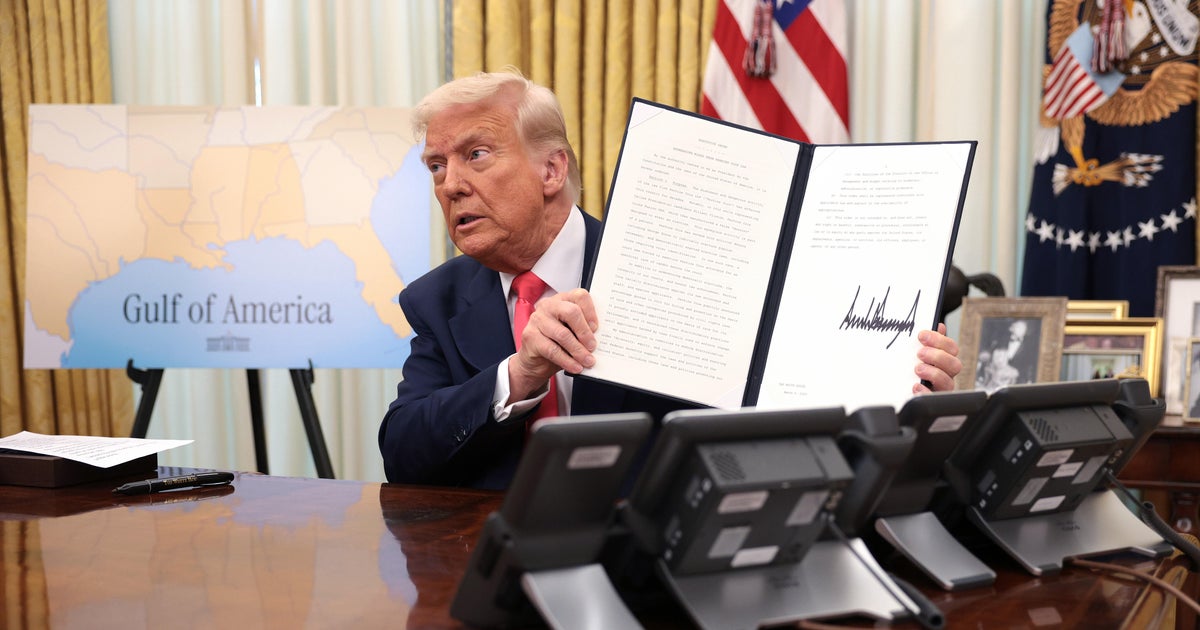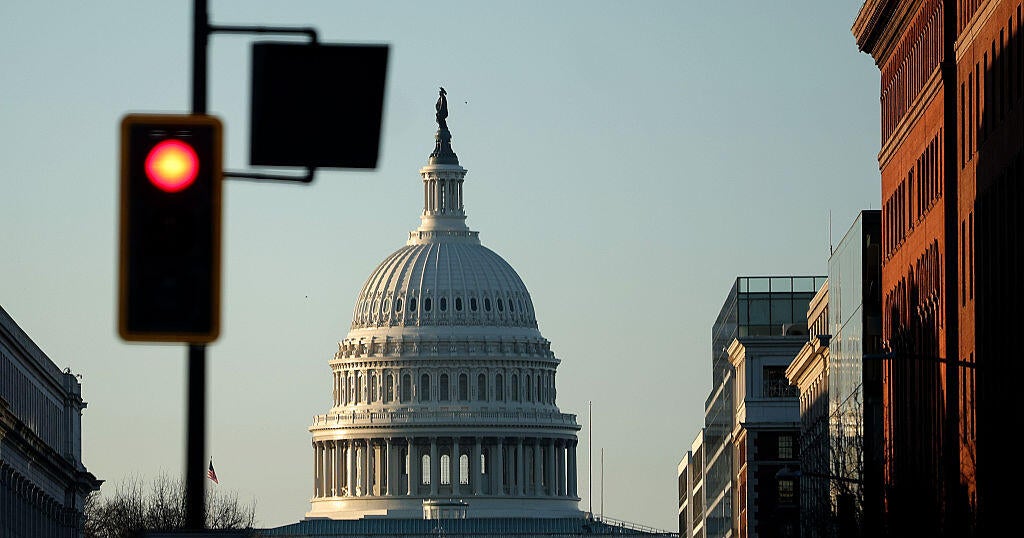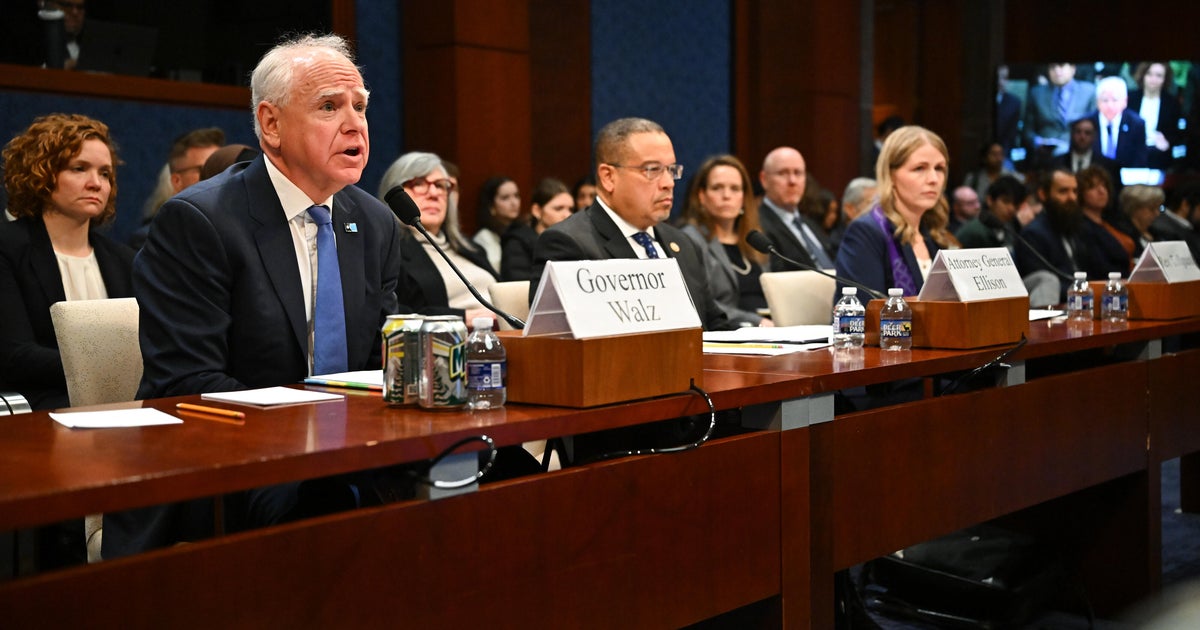House Jan. 6 committee votes to refer criminal charges for Trump
The House Jan. 6 committee voted to refer criminal charges to the Justice Department for former President Trump and lawyer John Eastman for their alleged roles in the attack on the U.S. Capitol.
"The whole purpose and obvious effect of Trump's scheme were to obstruct, influence, and impede this official proceeding, the central moment for the lawful transfer of power in the United States," committee member Rep. Jamie Raskin said.
The committee made four criminal referrals for Trump: Obstruction of an Official Proceeding; Conspiracy to Defraud the United States; Conspiracy to Make a False Statement and "Incite," "Assist" or "Aid and Comfort" an Insurrection.
But referrals by Congress are merely recommendations, and the Justice Department is under no obligation to bring charges against those referred for prosecution. Still, the committee's referrals could increase political pressure on the department to act, and lawmakers could unveil new evidence in their final report that federal prosecutors have not yet accessed.
The Justice Department did not comment Monday.
The committee also recommended four Republican members of Congress to the House Ethics Committee for punishment for their failure to comply with the committee's subpoenas. Those four are: House Minority Leader Kevin McCarthy and Reps. Andy Biggs, Jim Jordan and Scott Perry. Under the new GOP House majority, McCarthy is running to be the next speaker, and Biggs plans to challenge him.
Committee chair Rep. Bennie Thompson emphasized how important "accountability" was for Trump and his allies. "Accountability that can only be found in the criminal justice system," Thompson said. "We have every confidence that the work of this Committee will help provide a roadmap to justice, and that the agencies and institutions responsible for ensuring justice under the law will use the information we've provided to aid their work. And for those of you who have followed this Committee's work, I hope we have helped make clear that there's a broader kind of accountability. Accountability to all of you: the American people."
The proceedings mark the culmination of the panel's nearly 18-month-long investigation into the attack on the U.S. Capitol, which featured testimony from dozens of witnesses and a series of high-profile hearings that examined the assault and Trump's role in stoking his supporters to storm the building. The committee recapped their findings from the previous hearings, including depositions, in-person testimony from witnesses, and video from the attack on the U.S. Capitol.
Trump has maintained he did nothing wrong on Jan. 6, and that the investigation by what he calls the "Unselect Committee of political hacks" is a "witch hunt." After the hearing, he posted on Truth Social that "these folks don't get it that when they come after me, people who love freedom rally around me."
He continued that "it strengthens me" and "what doesn't kill me makes me stronger."
Here's how the Jan. 6 committee's criminal referrals could impact Trump's 2024 campaign
Raskin says "this is not exactly an Agatha Christie mystery, we know exactly who done it and why he did it"
Rep. Jamie Raskin, a Democratic member of the committee, told CBS News' Major Garrett on Monday night that the committee made the referrals against Trump and Eastman because the committee felt "we have an overwhelming and abundant amount of evidence to justify a criminal referral to the Department of Justice."
Speaking after the blockbuster hearing, Raskin said that that isn't to say that others such as Rudy Guiliani and Mark Meadows won't be part of a criminal referral message from the committee in the upcoming days when the committee releases the full report. "We just didn't have the same amount of detail in the evidence that we had for Donald Trump and for John Eastman," Raskin said.
Raskin noted that there is "no comparison" between what the House Jan. 6 committee has gathered but "nonetheless, we were still able to assemble lots of evidence, some of which just seemed overwhelming in particular cases, and in others, we basically say to the Department of Justice, please do your job and check it out."
But Raskin added that he has "no doubt" that "none of this would have happened or taken place absent the will to try and seize the presidency and try to overthrow the 2020 election."
While some Republicans have alleged the committee's evidence has not faced an "adversarial" approach, but Raskin said any investigation Congress undertakes is not subject to the adversarial system of prosecution and defense.
"And the truth is that I've never seen, really, such an open and shut case of what happened," Raskin said. "This is not exactly an Agatha Christie mystery – we know exactly who done it, and why he did it and how he tried to go about doing it. If there's another story out there, with 10 other alibis and explanations, bring it on, but we didn't encounter any of them in the course of talking to all of these Republicans who were in Donald Trump's administration, who were in his Cabinet, who were in his family. Everyone told the same story."
Raskin, a constitutional attorney, said there are three different ways the insurrection charge could meet the prosecutorial standard. He said one way is to show incitement to insurrection, another possibility is to show that there is assisting of the insurrection and the third is to show giving aid and comfort to insurrectionists.
"You only have to show one, but in this case, all three are clearly present in the case of Donald Trump," Raskin said. "He clearly incited the violent insurrection with dozens of statements he made over weeks and days and hours leading up to the attack … secondly, he assisted the insurrectionists. One way of knowing that is thinking of the tweet he sent at 2:24 p.m. when he knew that the riot had overtaken the Capitol, he knew that we had been driven out of the House and Senate and he knew that the vice president was fleeing, and instead of calling the joint chiefs of staff, or the Secretary of Defense, or the National Guard or the D.C. or Capitol police, he sent out a tweet, saying Mike Pence didn't have the courage needed to be done. In other words, he further assisted the insurrectionists by inflaming and exacerbating the situation. And finally, he gave aid and comfort to the insurrectionists on that day and throughout the day, especially when said, you're very special, I love you, never forget this day and so on. And he's continued to do that, including dangling the prospect of a mass pardon of all the convicted violent insurrectionists if he gets back into office."
U.S. Capitol police chief tells Senate panel of plans to beef up civil disturbance unit in wake of Jan. 6 attack
Minutes after the House Jan. 6 select committee completed its meeting and criminal referrals on Monday, a Senate panel questioned U.S. Capitol police chief Thomas Manger about vulnerabilities and upgrades in U.S. Capitol Police protection of members of Congress and the Capitol grounds.
At a hearing of the Senate Rules committee, Manger said there are plans for a fuller reopening of the U.S. Capitol complex, to pre-COVID and pre-Jan 6 levels, within three months.
The chief says the agency is trying to beef up its civil disturbance unit, in the wake of the Jan 6 attack. He said the agency has increased the number of riot police platoons, is issuing bonus pay to get more officers to work civil disturbance assignments. The agency also brought in European expert riot control teams to help better train the U.S. Capitol Police civil disturbance squad.
In the wake of the Paul Pelosi attack, the Capitol Police said they're seeking 64 additional agents to protect Congressional leadership and other members who need enhanced protection – a large undertaking.
The U.S. Capitol police investigated over 9,000 threats last year, and 458 of those cases were referred for prosecution. Less than 10% of those cases were prosecuted. The chief testified more prosecution is needed for deterrence against future threats.
Manger also testified some cameras have been reconfigured or added to enhance visuals throughout the campus.
Jan. 6 committee recommends four charges for Trump
For the first time in U.S. history, Congress has referred a former president to the Justice Department for possible criminal prosecution. The Jan. 6 committee voted to recommend four criminal charges against Donald Trump for his role in trying to overturn the 2020 election. Nikole Killion has the details.
Trump says that when "they come after me," it "strengthens" him
In a post on Truth Social, Trump wrote "these folks don't get it that when they come after me, people who love freedom rally around me."
He continued that "it strengthens me" and "what doesn't kill me makes me stronger."
"The people understand that the Democratic Bureau of Investigation, the DBI, are out to keep me from running for president because they know I'll win and that this whole business of prosecuting me is just like impeachment was — a partisan attempt to sideline me and the Republican Party," Trump continued.
Biggs says referral to House Ethics Committee is a "sham"
Rep. Andy Biggs, one of the four members of Congress who the committee referred for sanctions to the House Ethics Committee, slammed the action in a statement on Monday – and he said the Republican-led Congress will set "the record straight."
"An eleventh-hour referral to the House Ethics Committee proves the sham J6 Committee never truly needed our testimony," Biggs said in the statement. "They only wanted the testimony to have the ability to edit and misconstrue our statements to further their own false narratives, as they did with so many other witnesses."
Biggs claimed it is "inappropriate to use the House Ethics Committee" to "help reach the J6 Committee's pre-determined conclusions." He also accused the committee of having "defamed my name and character."
McConnell says "the entire nation knows who was responsible for that day"
Senate Minority Leader Mitch McConnell, who voted against convicting Trump in the Senate but then castigated him in a speech afterward, issued a statement after Monday's hearing without naming the former president.
"The entire nation knows who is responsible for that day," McConnell said. "Beyond that, I don't have any immediate observations."
Seven Republican senators voted to convict Trump in Feb. 2021, making the vote 57-43, falling far short of the 67 votes needed. Although McConnell did not vote to convict, he said in a speech afterward that Trump was "practically and morally responsible" for the attack.
McConnell and Trump have long been at odds with each other and frequently differed on backing candidates in the 2022 election.
Trump campaign issues statement saying committee held "show trials"
Trump's 2020 campaign issued a statement on Monday slamming the committee as holding "show trials by Never Trump partisans who are a stain on this country's history."
"This Kangaroo court has been nothing more than a vanity project that insults Americans' intelligence and makes a mockery of our democracy," the campaign continued.
Ahead of Monday's hearings, Trump had trashed the committee on his social media platform, Truth Social, using similar language.
Eastman, attorney dismiss significance of criminal referral
Eastman and his attorney, Charlie Burnham, held a call with reporters after Monday's meeting. Eastman said he was providing legal advice to then President Trump that was within his duties as an attorney, and he claimed he received requests from states about alleged voter fraud that caused him to ask the vice president to delay the certification.
Burnham, meanwhile, said the referral has "no legal significance" and "carries no more weight than anyone else who has an opinion on what the Department of Justice should be focused on."
Secret Service confiscated trove of weapons from Ellipse rally attendees, committee finds
Documents from the Secret Service on file with the select committee detail the slew of weapons that officers confiscated from the 28,000 Trump supporters passing through magnetometers to attend the rally at the Ellipse featuring the former president — before the Capitol assault:
242 cannisters of pepper spray;
269 knives or blades;
18 brass knuckles;
18 tasers;
6 pieces of body armor;
3 gas masks;
30 batons or blunt instruments;
17 miscellaneous items like scissors, needles, or screwdrivers.
The committee noted in its executive summary released Monday that "thousands" of other attendees remained outside the magnetometers or left their packs outside.
While some of the rally-goers brought weapons, others brought guns, according to the 161-page summary. Three Florida men near the Washington Monument the morning of Jan. 6 brandished AR-15s in front of officers with the Metropolitan Police Department, for example. The department also advised an individual was possibly armed with a "Glock," while another may have been armed with a "rifle."
Meanwhile, the National Park Service detained a person with a rifle, according to the panel's findings.
"Hours before the Ellipse rally on Jan. 6, the fact that the assembled crowd was prepared for potential violence was widely known," the select committee wrote. "In addition to intelligence reports indicating potential violence at the Capitol, weapons and other prohibited items were being seized by police on the streets and by Secret Service at the magnetometers for the Ellipse speech."
Committee criminal referrals against Trump unprecedented, but largely symbolic
The Jan. 6 select committee's vote to refer Trump and Eastman to the Justice Department for potential criminal prosecution is a historic one without precedent, as it marks the first time a former president has been the subject of a criminal referral by Congress.
The move is also a significant escalation for investigations mounted by Congress, as the panel collected mounds of evidence that it believes demonstrate violations of federal law by Trump.
But the referrals are recommendations and do not force the Justice Department to bring charges against Trump and allies. The department now faces the weighty decision of whether to bring charges against Trump stemming from the efforts to overturn the results of the 2020 presidential election.
Attorney General Merrick Garland has already faced calls to prosecute Trump for his conduct surrounding the Jan. 6 assault, but the select committee's findings are sure to ramp up the pressure on Garland and Jack Smith, the special counsel appointed to oversee the Justice Department's ongoing investigation into the attempts to thwart the transfer of power.
The Justice Department declined to comment on the criminal referrals made by the House select committee.
Raskin on legacy of Jan. 6 committee
After the hearing, Rep. Jamie Raskin was asked what he thinks the committee's legacy will be.
He said he hopes it will be an "unswerving devotion to the facts, the rule of law and the Constitution."
"We were charged with dealing with an event that was radically unique in American history," the Maryland Democrat told reporters. "Nobody before — much less a president — had ever come so close to overthrowing a presidential election and bypassing the Constitution."
Raskin said he hopes that the committee shining a light on the scheme to overthrow the 2020 election means that such a plot will never be attempted again.
"Our greatest legacy and our most enduring legacy would be one that is certified by time, which is that we never encounter anything like this again and that we keep the progress of American democracy moving," he said.
The committee, which started in July 2021, will sunset at the end of this year as Republicans are set to take control of the House in January.
Committee unanimously votes to adopt final report
Rep. Elaine Luria moved that the committee favorably report to the House the select committee's final report, which includes legislative recommendations and criminal referrals.
A recorded vote was requested and the roll taken by the clerk, and the vote was unanimous, 9-0.
Thompson then adjourned the panel, and as lawmakers stood to depart the hearing room, they left to brief applause.
Raskin introduces criminal referral proposals for Trump and Eastman
Rep. Jamie Raskin said the committee has gathered sufficient evidence to make criminal referrals for both Trump and Trump attorney John Eastman under statutes outlawing obstruction and conspiracy to defraud the United States.
Raskin noted U.S. District Court Judge David Carter earlier this year examined some of the committee's evidence and concluded that both Trump and Eastman likely violated two federal criminal statutes, "the starting point" for the committee's analysis.
First, Raskin said the committee believes the committee has gathered sufficient evidence to make a criminal referral of obstruction for Trump, Eastman and others.
"The whole purpose and obvious effect of Trump's scheme were to obstruct, influence, and impede this official proceeding, the central moment for the lawful transfer of power in the United States," Raskin said.
Second, the committee believes there is "more than sufficient evidence" to refer Trump, Eastman and others under a federal statute that makes it a crime to conspire to defraud the United States.
"Former President Trump did not engage in a plan to defraud the United States acting alone," Raskin said. "He entered into agreements, formal and informal, with several other individuals who assisted with his criminal objectives. Our report describes in detail the actions of numerous co-conspirators who agreed with, and participated in, Trump's plan to impair, obstruct and defeat the certification of President Biden's electoral victory."
Next, the committee is making a referral that outlaws knowingly and willfully making materially false statements to the federal government. Raskin said the evidence "clearly suggests that President Trump conspired with others to submit slates of fake electors to Congress and the National Archives." Raskin said the committee believes there is "more than sufficient" evidence to refer Trump and others under that statute.
"We don't try to determine all of the participants in this conspiracy, many of whom refused to answer our questions under oath," Raskin said. "We trust that the Department of Justice will be able to form a more complete picture through its investigation."
Finally, Raskin invoked a statute applying to anyone who incites, assists or engages in insurrection against the United States, or gives "aid and comfort" to an insurrection."
"The committee believes that more than sufficient evidence exists for a criminal referral of former President Trump for assisting or aiding and comforting those at the Capitol who engaged in a violent attack on the United States," Raskin said. "The committee has developed significant evidence that President Trump intended to disrupt the peaceful transition of power."
Further, Raskin said the committee is referring four members of Congress to the House Ethics Committee for punishment for their failure to comply with the committee's subpoenas.
Raskin asked the committee for unanimous consent directing the chairman to transmit the evidence related to those referrals to the Justice Department.
Luria says Trump "actively disregarded his constitutional obligation" as violence escalated at U.S. Capitol
Rep. Elaine Luria summarized the 187 minutes that transpired from the end of his speech at a rally on the Ellipse at 1:10 p.m. on Jan. 6 to 4:17 p.m., when he tweeted a video instructing the mob to leave the Capitol grounds.
"For 187 minutes, he actively disregarded his constitutional obligation to take care that the laws are faithfully executed," said Luria, a Virginia Democrat. "As we have established through months of investigation, that is because the mob wanted what President Trump wanted: to impede the peaceful transition of power."
Luria cited the numerous attempts by his allies — administration officials, members of Congress, Fox News commentators and members of his family — to urge him to tell his supporters to retreat from the Capitol, though he refused their pleas.
"During the day, the president never spoke with National Guard, the Department of Defense, the Department of Justice, or any other law enforcement agency," she said. "At no point during the day — or any other — did he issue any order to deploy any law enforcement agency to assist."
The Virginia congresswoman reiterated that multiple witnesses told the committee of Trump's refusal to intervene as the violence escalated, but did call his lawyer, Rudy Giuliani. The two spoke with congressional leaders to encourage them to continue delaying the joint session of Congress, Luria said.
The committee played new testimony from Kellyanne Conway, former senior counselor to Trump, who recalled a conversation she had with the then-president on Jan. 7.
"I just said that it was just a terrible day. I'm working on a long statement. I said it's crazy," Conway told the committee.
Asked what Trump said in response, Conway recalled he said, "No, these people are upset. They're very upset."
"In summary: President Trump lit the flame, poured gasoline on the fire, and sat by in the White House dining room for hours watching the fire burn," Luria said. "And today he continues to fan those flames. This was an extreme dereliction of his duty."
Trump refused aides' suggestions to tweet about nonviolence, Hope Hicks testified
When President Trump's efforts to get state and federal officials to go along with his scheme failed, he then turned to his supporters, Florida Rep. Stephanie Murphy said.
"He summoned a crowd to the nation's capital on Jan. 6, hoping that they would pressure Congress to do what he could not do on his own," she said.
Between Dec. 19, 2020, and Jan. 6, 2021, Trump repeatedly encouraged his supporters to come to Washington, D.C., she said. His Dec. 19 tweet "galvanized domestic violent extremists, including members of the Oath Keepers, the Proud Boys and organized militia groups."
His supporters then began organizing to come to the Capitol "with the specific intent to use violence to disrupt the certification of the election during the joint session," Murphy said.
Meanwhile, law enforcement agencies were gathering "substantial evidence" about the potential for violence during the joint session, she said.
Trump's advisers were also warning him that he should tell his supporters to be "peaceful" on Jan. 6, "but he refused," she said.
Murphy said one of Trump's top aides, Hope Hicks, said she had tried to suggest that Trump should warn his supporters to be non-violent, but "he refused."
In testimony, Hicks said "he" was Eric Herschmann and she had not spoken to Trump about it directly.
"I didn't speak to the president about this directly, but I communicated with people like Eric Herschmann that it was my view that it was important that the president put out some kind of message in advance of the event," Hicks said in video testimony.
"Mr. Herschmann said that he had made the same recommendation directly to the president and that he had refused," Hicks said.
Aguilar recounts Trump's repeated pressuring of Pence
Rep. Pete Aguilar said Trump's "multi-part plan" included pressing the man who had "served him loyally for four years," or then-Vice President Mike Pence.
"When Vice President Pence and many others—including Trump's own lawyer, John Eastman—told him, correctly, that this was unlawful, former President Trump spearheaded an unprecedented pressure campaign to coerce him to do it anyway, ultimately culminating in a dangerous threat to Mr. Pence's life on Jan. 6," Aguilar said.
Aguilar noted that Trump "repeatedly" pressured Pence to assume Eastman's proposal, although Pence told the president he lacked the authority to reject the electoral votes for Mr. Biden. That culminated in a phone call on the morning of Jan. 6 between Trump and Pence in which Trump "repeatedly berated Mr. Pence by cursing and leveling threats," Aguilar alleged.
Aguilar said White House staffer Nick Luna was among those who confirmed the details of the call.
Trump and others urged Pence to change his mind, Aguilar noted. In his speech at the Ellipse and in tweets, Trump pushed Pence to have the "courage to do what he has to do."
That afternoon of Jan. 6, rioters chanted "Hange Mike Pence," forcing Pence to flee into hiding.
Kinzinger summarizes Trump's attempt to push Justice Department to challenge election results
Focusing on Trump's efforts to push the Justice Department to challenge the results of the 2020 presidential election, with support from his ally, lawyer Jeffrey Clark, GOP Rep. Adam Kinzinger of Illinois criticized Trump for attempting to use the department to pursue his quest of remaining in power.
"It's of the utmost importance that our Department of Justice operates as a fair and neutral body that enforces our federal laws without fear or favor," Kinzinger said. "It is this critical function that President Trump sought to corrupt, as he sought to use the Department of Justice to investigate and prosecute purported election fraud and to help him convince the public that the election was stolen."
The congressman noted that department leaders — among them then-Attorney General Bill Barr, acting Attorney General Jeffrey Rosen and Richard Donoghue — repeatedly told the former president there was no widespread fraud and his claims were false.
Still, even as the claims of election fraud were debunked,Trump attempted to install an ally, Clark, to lead the Justice Department as acting attorney general. Clark had drafted a letter to Georgia officials falsely stating the department had "significant concerns" about the election results there and encouraging state legislatures to appoint a new slate of presidential electors.
The scheme involving the letter led to a tense meeting in the Oval Office on Jan. 3, 2021, during which top White House advisers and Justice Department officials objected to Clark's appointment and threatened to resign if he were named.
"Donald Trump would be leading a graveyard," Kinzinger said. "It was only after the threat of mass resignations that President Trump rescinded his offer to Mr. Clark."
Schiff recaps Trump and allies' pressure on local election officials
Rep. Adam Schiff laid out how the president and his allies "repeatedly pressured state officials to take action to overturn the results of the election."
The most "dramatic" such example, Schiff said, was when Trump called Secretary of State Brad Raffensperger in January 2021 and urged him to "find 11,780 votes," according to a recording of the call. Schiff noted Trump suggested Raffensperger and his attorney could be subject to criminal action if they didn't do as he said.
Schiff also noted how Trump wanted to transmit false Electoral College ballots to Congress and the National Archives, despite realizations by Trump and White House attorneys that such a move was unjustified and possibly unlawful.
"The select committee has developed evidence that these intentionally false documents were transmitted to multiple officers of the federal government, and were intended to interfere with the proper conduct of the joint session, where the existence of so-called 'competing slates' of electors would serve as a pretext for legitimate electoral votes to be rejected," Schiff said.
Schiff replayed testimony from local election official Ruby Freeman, who testified that she doesn't even share her name in public out of fear for retribution and her own safety.
"The treatment of Ms. Freeman, and her daughter Shay Moss, and so many others around the country, was callous, inhuman, inexcusable, and dangerous, and those responsible should be held accountable," Schiff said.
Lofgren alleges Trump used donations to try and sway witnesses
Rep. Zoe Lofgren disclosed that President Trump raised hundreds of millions "with false representations" to his supporters after the 2020 election and the proceeds "have been used in ways that we believe are concerning."
She said the committee has learned that some of the funds were used to hire lawyers, and it also has evidence "of efforts to provide or offer employment to witnesses."
"For example, one lawyer told a witness the witness could, in certain circumstances, tell the committee that she didn't recall facts when she actually did recall them," the California Democrat said. "That lawyer also did not disclose who was paying for the lawyer's representation, despite questions from the client seeking that information. He told her, 'we're not telling people where funding is coming from right now.'
"We've learned that a client was offered potential employment that would make her 'financially very comfortable' as the date of her testimony approached by entities that were apparently linked to Donald Trump and his associates," Lofgren said. She noted that the offers "were withdrawn or didn't materialize," once reports emerged about what her testimony contained. And the witness thinks it was an "effort to affect her testimony."
Lofgren did not reveal the name of the witness approached or the name of the lawyer.
In arguing that Trump had purposely disseminated false allegations of voter fraud in the 2020 election, Lofgren also played a clip of testimony by longtime Trump aide Hope Hicks, who told the committee that she "wasn't seeing evidence of fraud on a scale that would have impacted the outcome of the election." She said she was growing "concerned that we were damaging his legacy." Hicks said that Trump, in response, "said something along the lines of, you know, 'Nobody will care about my legacy if I lose, so that won't matter. The only thing that matters is winning.'"
Trump's refusal to intervene during Capitol attack was an "utter moral failure," Cheney says
In her opening remarks, Cheney, the panel's vice chair, charted her own family's history fighting for the union in the Civil War and the consecutive presidents who over time have accepted the results of presidential elections and allowed for the transfer of presidential power, with the exception of one.
"Every president in our history has defended this orderly transfer of authority, except one," Cheney said. "Jan. 6, 2021, was the first time one American president refused his constitutional duty to transfer power peacefully to the next."
Cheney said the guarantee of the peaceful transfer of power lies "at the heart of our republic."
Highlighting the events of Jan. 6, as the mob of Trump's supporters descended upon the Capitol, Cheney said among the most "shameful" findings from the panel was his failure to urge the rioters to disperse and leave the Capitol grounds, despite repeated requests for him to do so from his family members and close aides.
"This was an utter moral failure and a clear dereliction of duty," Cheney said, noting that amid the violence at the Capitol, Trump sat in the dining room off the Oval Office watching the events transpire on television.
The Wyoming Republican repeated that Trump is "unfit" for any office.
"No man who would behave that way at that moment in time can ever serve in any position of authority in our nation again," Cheney said.
Thompson opens committee's final meeting, says final report will provide "roadmap to justice"
Rep. Bennie Thompson gaveled in the committee's final meeting shortly after 1 p.m., recapping the committee's efforts.
"To cast a vote in the United States is an act of faith and hope," Thompson said. "When we drop that ballot in the ballot box, we expect the people named on that ballot are going to uphold their end of the deal. The winner swears an oath and upholds it. Those who come up short ultimately accept the result and abide by the rule of law. That faith in our system is the foundation of American democracy. If the faith is broken, so is our democracy. Donald Trump broke that faith. He lost the 2020 election and knew it. But he chose to try to stay in office through a multi-part scheme to overturn the results and block the transfer of power."
Thompson said they expect their final report to be filed with the Clerk of the House and made public later this week, along with the rest of non-sensitive transcripts and documents by the end of the year.
"This committee is nearing the end of its work," Thompson continued. "But as a country, we remain in strange and uncharted waters. We've never had a President of the United States stir up a violent attempt to block the transfer of power. I believe, nearly two years later, this is still a time of reflection and reckoning."
Thompson said the committee will lay out final recommendations in its final report on how to avoid another such event. That report will describe a "roadmap to justice," he said.
Still, Thompson said the most important piece of preventing a similar incident is "accountability," as the committee votes on criminal referrals.
Exclusive: Flynn deposition reveals questions about pressure on U.S. intelligence
New audio files obtained by CBS News reveal how a congressional investigator pushed retired Lt. Gen. Michael Flynn, the former national security adviser to former President Donald Trump, to testify about his efforts to overturn the 2020 presidential election and questioned Flynn about whether he pressured military and intelligence officials to assist him with that endeavor.
The audio files are the latest window into the work of the House select committee investigating the Jan. 6, 2021 assault on the Capitol and its attempt to learn more about the extent of Flynn's contacts with defense and intelligence officials.
Flynn's activity has long been a point of interest for the committee, according to two people familiar with the Jan. 6 panel who were not authorized to speak publicly, and it has probed witnesses about whether Flynn pressured people working inside the government as he supported Trump on the outside.
The committee's line of inquiry in the Flynn deposition appears to seek specificity about the extent to which Flynn sought out officials, as well as the motivation of any outreach, details on any recommendations he made or documents he circulated, and whether he was paid or acting at the behest of Trump or others.
Read more about the deposition here.
The history of the Jan. 6 committee
The Jan. 6 committee was formed in July 2021 after House Speaker Nancy Pelosi's attempts to create an independent, bipartisan commission to investigate the attack, similar to the commission that investigated the Sept. 11, 2001 terrorist attack, were thwarted by Senate Republicans. The committee includes seven Democrats and two Republicans — Reps. Liz Cheney and Adam Kinzinger — who broke with GOP leadership to join.
The committee began its investigative work with a hearing held in July 2021 that featured several law enforcement officers. Over the next 11 months, the committee conducted more than 100 interviews, including with some in Trump's inner circle and even in his family, and subpoenaed more than 1,000 documents.
The committee then held a series of blockbuster public hearings beginning in June to present some of the evidence that had been gathered. In the hearings, the committee focused on different parts of what members have alleged was a multi-pronged effort by Trump and his allies to overturn the 2020 election results, including pressure campaigns on then-Vice President Mike Pence and his staff and top members of the Justice Department as well as local and state elections officials.
The committee also shed light on an alleged scheme by Trump and his allies to replace electors in seven battleground states won by President Biden, with a slate of Trump electors. Committee chair Bennie Thompson, a Democrat from Mississippi, said in July that the lawmakers were speaking with the Justice Department about the alleged scheme.
The hearings sought to tie Trump to the mobilization of his supporters at the Capitol on Jan. 6, 2021. The committee showed recorded testimony from witnesses, never-before-seen video from the day of the riot, in-person testimony from an injured Capitol police officer, and interviews with members of the Trump White House, his campaign, Pence's office, a retired federal judge, state and local elections officials, a former spokesperson for the Oath Keepers and an Ohio man who pleaded guilty for his role in the Jan. 6 riot.
In the final hearing in October, the committee voted to subpoena Trump for documents and testimony. They issued the subpoena in mid-November, and Trump filed a lawsuit attempting to quash it.
